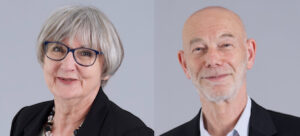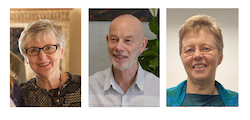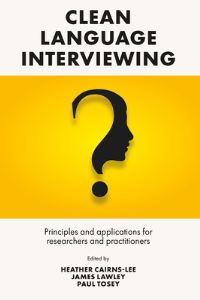Published in Anchor Point, Vol 9, No 9, Sep 1995
“What this group is doing here really does remind me of how NLP started in the first place. There are not very many places I’ve been in the world where the community spirit of NLP is creating what you are creating here. And that is a really wonderful thing and you all do yourselves proud. It makes me want to cry because this is what I want to see happening.” – Judith DeLozier, 19 April 1993*
“How do you do it?” is the question most asked about the success of The NLP Group – London: A Practice & Support Network. “How did you build and maintain such a successful group?”
It began by using NLP with ourselves and creating visions; it developed with a loosely organised “learning committee” made up of volunteers who shared common values; it evolved with careful attention to feedback, taking decisions based on the presuppositions of NLP; and it continues because we apply the process to the process… over and over again… learning to learn.
In the beginning...
It began in 1991 when James Lawley wanted to start a group to practice his practitioner level NLP skills. Three people joined him, and premises in central London were offered as a convenient gathering place. We met every Tuesday night, sometimes with just two of us attending.
In a few months members from another group who were disbanding due to lack of support asked if they could join us. Our average Tuesday attendance soared to six or eight, and we began to have a loosely planned structure to the evenings. At the U.K. Association for NLP (ANLP) Conference we networked and told others what we were doing, although this did not yield many new participants. We named ourselves The Central London Practice and Support Group.
The “dream beyond the dream...”
Then, on our Master Practitioner training, the trainer said, “Dream the dream… then dream the dream beyond the dream”. In a cafe one day we asked the question, “How do you do that? How do you operationalise dreaming beyond the dream?”
“Let’s try it using the practice group as the context”. And we did. We dreamed of 20 people regularly attending. We dreamed of a formal programme of events. We went on to dream of the top British NLP trainers supporting the group and presenting sessions.
We dreamed of our members taking their NLP skills into the community; to charities and hostels, onto the streets with the homeless, into the unemployment centres, all with the support of the group behind them. We dreamed of being an independent contact point and information source for NLPers from Europe, from North America, from all over the world.
Then we dreamed of 50 people attending the group regularly and visits from international guest speakers… maybe Judith DeLozier, and Tad James and even Richard Bandler and John Grinder would come to speak! We dreamed of being contacted to assist others with their NLP research projects, or of sponsoring our own research. We went on and on, and, laughing, stopped when we dreamed the United Nations had contacted the group to send a team to the Middle East Peace crisis!
“Communities are not made, they happen. You cannot start nor prevent them, as you cannot start or stop a river. Too many factors are involved in the creation of a successful community – and inner maturity is one of them.”
Sri Nisargadatta Maharaj
And then ...
Within a few weeks, new faces began arriving in their ones and twos; then in their tens and twenties. We produced a programme of events for the next two months. The group was growing rapidly, and we realised we needed help. This was a significant moment for us. We decided not to set up the traditional-style committee, but to model successful organisational structures that were simple to administer, versatile, responsive to feedback, durable, and could adjust quickly to a changing environment.
We decided to model our ‘committee’ on the format used to administer 12-Step Programmes (used so successfully by Alcoholics Anonymous for over 60 years).
It is based on a set of principles, of alignment behind a common purpose and run by volunteers who serve in the spirit of gratitude and contribution.
How the committee works
So anyone who is willing to make a contribution to the group can join the Committee and take on particular functions for a set period. After that they continue or step down, as they choose. It’s as simple as that. No elections, no officers, no job descriptions, no hassle! Just people who take responsibility for achieving an agreed outcome.
This is a ‘not for profit’ volunteer organisation where no one gets paid; not the speakers, not the Committee, not the people who organise the evenings. In fact, members of the Committee choose to pay the entrance fee like everyone else and attend a 9am Sunday morning meeting once every two months – this is what we call sensory specific evidence for commitment!
Naturally, we pay for the hire of the rooms, and cover all administration expenses. After that, all remaining money is reinvested in the group.
We also apply some of the 12-Step model to the group itself. There is no formal membership – people just attend the meetings as they wish. We have multi-level learning: the beginners role model and learn from those with more training, they in turn give of their experience freely (literally!) and learn in the process. After meetings participants go to a pub (not strictly the AA model!) or a cafe to continue talking, networking and socialising.
Decisions, decisions...
The group continued to grow, until we regularly had 30 people per night and a total ‘membership’ of over 100. Some of the original participants reported that the group was losing its intimate feel and wasn’t what it was supposed to be. Should we limit the numbers? Should we enforce skill levels?
We decided to allow numbers to rise, although at that time we expected everyone to have some NLP training. Many groups had disbanded from lack of support and we wanted to see where the momentum that had been created would take us. We suggested those who liked smaller groups get together and start a group of their own, even drawing from the resource of the larger group, with our blessing.
Another decision was that we were a Practice and Support group – not a training organisation. We set up a table with literature from all NLP training providers for participants to take away. Some of the training organisations who were wary of us at first began to reap the benefits of the interest in NLP being generated on Tuesday nights.
Then, beginners with little or no NLP experience began to arrive and this proved to be one of the committee’s greatest challenges and greatest gifts. Participants with extensive NLP training were having to practice with those who had no formal training and the most elementary NLP questions were taking up group time. Temperatures began to rise.
The response of the committee was to survey the views of the group to establish a picture of ‘current reality’, to energetically engage in NLP visioning and, as a result, to establish some guiding principles.
“In and through community lies the salvation of the world” – M. Scott Peck
Vision and mission...
Our first attempt at a Vision Day was less than successful. We asked, “What happened? How can we learn from this?” Our analysis revealed we had attempted to use the Disney Strategy but had fallen into the trap of not keeping our Dreamer, Realist and especially Critic states ‘clean’.
With our learnings, we re-scheduled another day, and this time it was a huge success. On August 1, 1993 the Central London Practice Group Vision was established, complete with our operating principles and priorities for the next 12 months. The vision included:
To evolve into a centre internationally recognised for its ability and commitment to promote NLP for world, community, individual learning and healing.
To provide a supportive community for people to use NLP to develop themselves, whatever their background or level of NLP.
To resource a low cost networking and information library.
To develop expertise in NLP research and modelling.
To sponsor projects which apply NLP to areas of social need, offer training to assist in the community, and/or which raise standards for the use of NLP.
A voice which promotes NLP to the government.
To operate out of a public service and voluntary ethos.
To use ‘simplicity’ as a guiding principle, i.e. minimum organisation of people, paperwork, processes and effort.
To be open and accountable in all of our relationships.
A new direction...
The decision was taken: to allow for and encourage newcomers to NLP to attend the group; to provide separate sessions for beginners, intermediates, practitioners (and more recently, master practitioners); to provide for people to learn in a variety of group sizes (so far that is between 2 and 250 participants!); and to set the entrance fee to $5 for waged and $1.50 for the unwaged.
Speakers are draw from the NLP community and generously contribute their time. Apart from most of the ‘traditional’ topics we have explored NLP in relation to: Sacred Ritual, Yoga, Dreams, Loving Relationships, UFOs, Gurdjieff, Singing, Sport, Driving, Global Conflict, Sexuality, and … and …
Our guest speakers have included almost all of the major NLP trainers in Britain. We are also fortunate to have been supported by several international guest speakers such as Judith DeLozier, Tad James and Richard Bandler. And John, if you are reading this, wouldn’t you like to complete our dream?
Our monthly format is:
1st Tuesday of the month: Participants Choice (Free format, Self-organising, plus Master Practitioner session).
2nd Tuesday: 3 Presentations (Beginner, Foundation, & Practitioner and above).
3rd Tuesday: Guest Speaker (everyone meets together).
4th Tuesday: 3 Presentations (Beginner, Foundation, & Practitioner and above).
5th Tuesday: (as applicable) Video Night (After watching a video we break into groups to practice).
New ventures
Ever eager to move into new areas, one of our members, a leading NLPer, set up an NLP Project Night. He provided a framework over a six-month period for people to develop themselves and make a contribution to the world. Participants learned how to set a project outcome, how to plan and implement a project, and how to provide mutual support to achieve their outcome. Although about 30 people began, only 8 chose to finish… but, wow, what they have achieved! Here are some examples:
Two participants designed, promoted, administered and delivered an entire 12-day program of facilitated practice sessions on a cost-only basis as part of their mission to make NLP affordable for all.
Another joined a Big Brother/Sister programme volunteering his time for a year to help a youth in need. He uses the group as a resource for himself.
Another has patented his idea for a revolutionary new bicycle and has been asked to join the faculty of a university.
Another established his own Shiatsu centre.
These people used the group as a support to take their skills into the community, and return, enriched, to share their experience and learnings with others.
“The word ‘community’ has ancient roots, going back to the joining of two IndoEuropean derivations: mei meaning ‘change’ or ‘exchange’ and kom meaning ‘with’ to give kommein: shared by all. So community means ‘change or exchange shared by all’” – Peter Senge, et. al., The Fifth Discipline Fieldbook,
And yet more ventures...
Part of the 1993 Vision was to organise a one-day NLP in the Community Conference. Never before had there been a conference solely devoted to the application of NLP to community topics. The first Conference in 1994 was attended by 80 people and was such a success that we ran it again in 1995, this time with 150 people attending! Topics at these Conferences have included NLP as applied to Dyslexia, Drug Addiction, International Conflict Resolution, Health Care, Policing, Art Education… and more.
Also, the committee decided to provide support for the numerous embryonic practice groups springing up around the country. We wondered, “Wouldn’t it be useful if the organisers of these groups could get together and model what works best?” So in 1994 we sponsored the first ever gathering of NLP Practice Groups.
It was a great success and we decided to produce a National Directory of NLP Practice Groups. This was published 3 months later and contained details of 24 groups. The Association for NLP offered to distribute the Directory and so far over 1500 have been sent to members of the public.
The second National Networking Day for NLP Practice Groups took place earlier this year. The Directory has since been updated to account for the growing interest in NLP and currently there are 32 practice and study groups in Britain.
Dealing with success... A sister group
Meanwhile, the numbers attending our own group kept growing! By the time weekly attendance had reached 60-120 we were beginning to feel the constraints of space. So in September 1994 we established a sister group on the other side of London which meets every Thursday evening. To mark the occasion we changed our name to The NLP Group London and adopted a logo.
We have a joint programme of events and a common philosophy; otherwise the groups are completely autonomous. A year on, our sister group is vibrant, thriving and developing on its own path.
While we have yet to achieve all our vision, we continue to expand into new areas. One of these is sponsoring weekend workshops for which our outcomes are:
To offer a low-cost opportunity for participants to develop themselves by acquiring NLP and related skills;
To promote the use of NLP in community-based applications; and
Where appropriate, to assist in the development
Secrets of our success
So back to the original question, “How do you do it?” We cannot give you a magic formula for reproducing this kind of success – developing any kind of group is too complex for that. What we can do is tell you what we believe has been fundamental to the group’s development over the last four years.
First and foremost is the quality of the ideals, the commitment to shared values and the impeccability of behaviour of those most active in the group. Then there is a genuine sense of service, of contributing to a larger system, of wanting to offer the wonder that is NLP to a wider community. Every one of us who organise the group have benefited enormously from taking on the attitude, methodology and techniques of NLP – and we want others to have the same opportunity.
We’ve come to realise that the group has a life of its own. Our job is to nurture what has been achieved, to continually respond to feedback, to respect diversity, and to be there to support developments as they emerge naturally.
And if you want to experience what the Group looks, sounds and feels like, why not come and visit? Let us know if you will be in London and want to attend the Group or be willing to present your ideas and lead us through an exercise or two! We’d really love to welcome our friends from across the water, in the spirit of NLP.
* Judith DeLozier’s quotation above comes from a talk she gave to The London NLP Group which forms the basis of the article:
Mastery, New Coding and Systemic NLP
Postscript
Added for the Rapport, Spring 2024, reprinting of the above story:
This article gives the backstory to James Lawley and Penny Tompkins’ journey with NLP… an inspirational narrative full of hope, the power visioning and the fulfilment of dreams…
In this article, Penny and James walk the talk of the NLP Presuppositions and inspire us all to bring dreams into being, whether it’s to create a practice group or apply the model elsewhere in our business or personal lives.
Penny and James will be delivering the 2024 Masterclass at the NLP International Conference on Saturday 11th May 2024 with their presentation, “Less is More: A Clean Approach to Mind, Metaphor and Modelling”.







